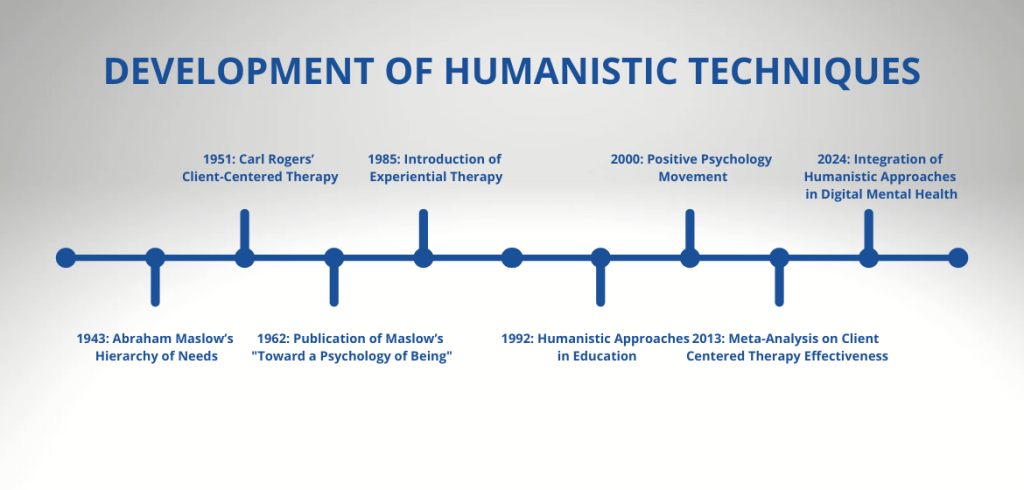
Empathy, Authenticity, and Growth: Exploring Humanistic Techniques in Therapy and Beyond
Humanistic techniques in interpersonal practice emphasise the inherent worth and potential of individuals, drawing heavily from the psychological theories of Carl Rogers and Abraham Maslow. These approaches prioritise personal growth, self-actualisation, and the importance of empathetic and authentic relationships. This article explores the key principles, techniques, and applications of humanistic approaches in various interpersonal settings, supported by contemporary research and practice examples.

Central to humanistic approaches is empathy, which involves understanding and sharing the feelings of another person. Carl Rogers, a pioneer in humanistic psychology, considered empathy a crucial component of effective therapy and interpersonal interactions. By fostering an empathetic environment, practitioners can create a space where individuals feel understood and supported, encouraging trust and openness. Alongside empathy, unconditional positive regard is another fundamental principle. This concept means accepting and valuing a person without judgment, which helps individuals feel respected and supported regardless of their behaviour or circumstances. Unconditional positive regard creates a non-judgmental atmosphere conducive to personal growth.
Authenticity, or congruence, is also vital in humanistic approaches. This principle involves being genuine and transparent in interactions. When practitioners are authentic, it encourages clients to be open and honest, promoting deeper connections and self-awareness. Furthermore, the pursuit of self-actualisation, as highlighted by Abraham Maslow, underscores the humanistic belief in the potential for individuals to achieve their fullest selves. Maslow’s hierarchy of needs places self-actualisation at the pinnacle, suggesting that individuals strive to achieve their best selves once their basic needs are met.
Several techniques embody these humanistic principles in practice. Client-centred therapy, developed by Carl Rogers, is one such approach that emphasises the client’s ability to self-heal and self-direct. In this therapy, the therapist provides a supportive environment through empathy, unconditional positive regard, and authenticity, allowing clients to explore and resolve their issues. Gestalt therapy is another technique that focuses on the present moment and the client’s immediate experiences. This approach encourages clients to become aware of their thoughts, feelings, and actions, promoting self-awareness and personal responsibility. Techniques such as role-playing and the “empty chair” exercise help clients process unresolved emotions and experiences.
Existential therapy explores themes such as meaning, choice, and responsibility, helping clients confront existential concerns like the search for purpose and the acceptance of mortality. This approach empowers individuals to lead more authentic and fulfilling lives. Experiential therapy involves activities and experiences, such as art, music, or movement, to help clients express and process emotions. By engaging the creative aspects of human experience, experiential therapy facilitates deeper emotional understanding and healing.
Application of Humanistic Techniques
Humanistic approaches have wide-ranging applications in various settings. In therapeutic settings, they are employed in individual therapy, group therapy, and family therapy. Research indicates that these approaches can be effective in treating a range of psychological issues, including depression, anxiety, and trauma. For instance, a meta-analysis of client-centered therapy found it to be effective in improving clients’ mental health and well-being (Elliott, Greenberg, Watson, Timulak, & Freire, 2013). In educational settings, humanistic principles foster a supportive and inclusive learning environment. Educators who apply these principles prioritise student well-being, encourage self-directed learning, and support the holistic development of students.
Moreover, humanistic approaches are valuable in organisational settings. By promoting empathetic and authentic communication, these approaches can enhance team dynamics, improve leadership, and foster a positive workplace culture. Employees who feel valued and understood are more likely to be engaged, motivated, and productive.
In conclusion, humanistic approaches in interpersonal practice offer a powerful framework for understanding and enhancing human relationships. By emphasising empathy, unconditional positive regard, authenticity, and the pursuit of self-actualisation, these approaches foster environments where individuals can thrive. Whether in therapy, education, or organisational contexts, the principles and techniques of humanistic psychology provide valuable tools for promoting personal growth, emotional well-being, and meaningful connections. As contemporary research continues to support the efficacy of these approaches, their application in various interpersonal settings remains a testament to their enduring relevance and impact.
Interested in Developing Your Skills?
Our B.A. (Hons) in Counselling & Psychotherapy is designed for those passionate about making a profound impact on others’ lives through empathetic and authentic interactions. The curriculum integrates cutting-edge theories and practical skills, emphasising humanistic approaches that prioritise empathy, unconditional positive regard, and authenticity. With expert faculty guidance you’ll be equipped to address a range of psychological issues, fostering personal growth and well-being in diverse settings. Enroll today and embark on a journey towards becoming a compassionate and skilled professional in mental health.






















